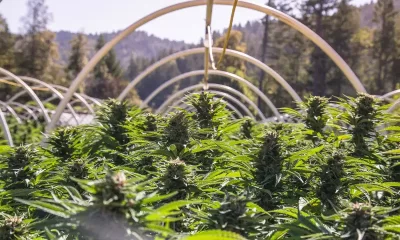Business
Elon Musk Denies 420 Tweet Was About Weed

“420 was not chosen because of a joke,” Elon Musk testified in a California court.
During a California court appearance Monday, when questioned about a 420 tweet, Elon Musk suddenly forgot the significance of the number in pot culture. The tech billionaire responded after being cornered by a prosecutor representing Tesla employees for a class action lawsuit alleging he tweeted and misled shareholders about the price of Tesla shares.
The fiasco began several years ago. In 2018, Musk rounded up Tesla shares from $419 to $420, announcing his plan to go private in a tweet. “Am considering taking Tesla private at $420,” Musk tweeted on Aug. 7, 2018. “Funding secured.”—sending officials from The Securities and Exchange Commission (SEC) into a tailspin.
Musk said he tweeted the share price based on what he said was a “firm commitment” from Saudi Arabia’s Public Investment Fund (PIF) to take Tesla private. But about 10 days later, Musk admitted that the Tesla buyout he had envisioned wasn’t going to materialize.
After an investigation, the SEC fined Musk $40 million, forcing the billionaire to step down as chair of Tesla’s board. The SEC said that Musk misled investors. In the SEC’s complaint, Musk was accused of rounding up the share price to $420 from $419 “because he had recently learned about the number’s significance in marijuana culture.”
Musk caused instantaneous uproar about a month later, sparking a blunt with Joe Rogan on his show “The Joe Rogan Experience” on Sept. 3, 2018, shocking Tesla investors and officials across the board. His troubles didn’t end there. High Times asked if it was “the most expensive blunt of all time” due to the fallout, with NASA- and SpaceX-associated officials reviewing his security clearance.
The Verge reports that Nicholas Porritt is an attorney for a class of Tesla investors suing Musk for millions of dollars that they say resulted from his failure to take Tesla private.
The courtroom got tense: “You rounded up to 420 because you thought that would be a joke that your girlfriend will enjoy, isn’t that correct?” Porritt asked. “No,” Musk said, adding, “there is some, I think, karma around 420. I should question whether that is good or bad karma at this point.”
Musk said that 420 wasn’t a weed joke, but a roughly 20% premium on the $419 stock price at the time. “420 was not chosen because of a joke,” Musk testified. “It was chosen because there was a 20 percent premium over the stock price.” Musk also claimed that it was a “coincidence.”
The jury will decide if Musk should have to pay out up to billions of dollars in damages to Tesla shareholders for the money they lost due to his tweets.
Judge Edward Chen ruled that the jury should be aware that Musk’s 2018 tweets are false. Jurors will now need to decide whether Musk deceived Tesla shareholders because of his tweets.
Musk said that he was not relying on a commitment for the Saudi PIF when he tweeted “funding secured,” adding that his shares in SpaceX would also help fund the deal to take Tesla private. “Just as I sold stock in Tesla to buy Twitter… I didn’t want to sell Tesla stock, but I did sell Tesla stock,” Musk said. “My SpaceX shares alone would have meant that funding was secured.”
Musk has also been sued by a group of former Twitter employees after a mass firing. Musk recently became the CEO of Twitter after buying the platform for $44 billion in October 2022. Saudi Prince Alwaleed bin Talal bin Abdulaziz is Twitter’s second-largest shareholder after Musk.
Source: https://hightimes.com/culture/people/elon-musk-denies-420-tweet-was-about-weed/
Business
New Mexico cannabis operator fined, loses license for alleged BioTrack fraud

New Mexico regulators fined a cannabis operator nearly $300,000 and revoked its license after the company allegedly created fake reports in the state’s traceability software.
The New Mexico Cannabis Control Division (CCD) accused marijuana manufacturer and retailer Golden Roots of 11 violations, according to Albuquerque Business First.
Golden Roots operates the The Cannabis Revolution Dispensary.
The majority of the violations are related to the Albuquerque company’s improper use of BioTrack, which has been New Mexico’s track-and-trace vendor since 2015.
The CCD alleges Golden Roots reported marijuana production only two months after it had received its vertically integrated license, according to Albuquerque Business First.
Because cannabis takes longer than two months to be cultivated, the CCD was suspicious of the report.
After inspecting the company’s premises, the CCD alleged Golden Roots reported cultivation, transportation and sales in BioTrack but wasn’t able to provide officers who inspected the site evidence that the operator was cultivating cannabis.
In April, the CCD revoked Golden Roots’ license and issued a $10,000 fine, according to the news outlet.
The company requested a hearing, which the regulator scheduled for Sept. 1.
At the hearing, the CCD testified that the company’s dried-cannabis weights in BioTrack were suspicious because they didn’t seem to accurately reflect how much weight marijuana loses as it dries.
Company employees also poorly accounted for why they were making adjustments in the system of up to 24 pounds of cannabis, making comments such as “bad” or “mistake” in the software, Albuquerque Business First reported.
Golden Roots was fined $298,972.05 – the amount regulators allege the company made selling products that weren’t properly accounted for in BioTrack.
The CCD has been cracking down on cannabis operators accused of selling products procured from out-of-state or not grown legally:
- Regulators alleged in August that Albuquerque dispensary Sawmill Sweet Leaf sold out-of-state products and didn’t have a license for extraction.
- Paradise Exotics Distro lost its license in July after regulators alleged the company sold products made in California.
Golden Roots was the first alleged rulebreaker in New Mexico to be asked to pay a large fine.
Source: https://mjbizdaily.com/new-mexico-cannabis-operator-fined-loses-license-for-alleged-biotrack-fraud/
Business
Marijuana companies suing US attorney general in federal prohibition challenge

Four marijuana companies, including a multistate operator, have filed a lawsuit against U.S. Attorney General Merrick Garland in which they allege the federal MJ prohibition under the Controlled Substances Act is no longer constitutional.
According to the complaint, filed Thursday in U.S. District Court in Massachusetts, retailer Canna Provisions, Treevit delivery service CEO Gyasi Sellers, cultivator Wiseacre Farm and MSO Verano Holdings Corp. are all harmed by “the federal government’s unconstitutional ban on cultivating, manufacturing, distributing, or possessing intrastate marijuana.”
Verano is headquartered in Chicago but has operations in Massachusetts; the other three operators are based in Massachusetts.
The lawsuit seeks a ruling that the “Controlled Substances Act is unconstitutional as applied to the intrastate cultivation, manufacture, possession, and distribution of marijuana pursuant to state law.”
The companies want the case to go before the U.S. Supreme Court.
They hired prominent law firm Boies Schiller Flexner to represent them.
The New York-based firm’s principal is David Boies, whose former clients include Microsoft, former presidential candidate Al Gore and Elizabeth Holmes’ disgraced startup Theranos.
Similar challenges to the federal Controlled Substances Act (CSA) have failed.
One such challenge led to a landmark Supreme Court decision in 2005.
In Gonzalez vs. Raich, the highest court in the United States ruled in a 6-3 decision that the commerce clause of the U.S. Constitution gave Congress the power to outlaw marijuana federally, even though state laws allow the cultivation and sale of cannabis.
In the 18 years since that ruling, 23 states and the District of Columbia have legalized adult-use marijuana and the federal government has allowed a multibillion-dollar cannabis industry to thrive.
Since both Congress and the U.S. Department of Justice, currently headed by Garland, have declined to intervene in state-licensed marijuana markets, the key facts that led to the Supreme Court’s 2005 ruling “no longer apply,” Boies said in a statement Thursday.
“The Supreme Court has since made clear that the federal government lacks the authority to regulate purely intrastate commerce,” Boies said.
“Moreover, the facts on which those precedents are based are no longer true.”
Verano President Darren Weiss said in a statement the company is “prepared to bring this case all the way to the Supreme Court in order to align federal law with how Congress has acted for years.”
While the Biden administration’s push to reschedule marijuana would help solve marijuana operators’ federal tax woes, neither rescheduling nor modest Congressional reforms such as the SAFER Banking Act “solve the fundamental issue,” Weiss added.
“The application of the CSA to lawful state-run cannabis business is an unconstitutional overreach on state sovereignty that has led to decades of harm, failed businesses, lost jobs, and unsafe working conditions.”
Business
Alabama to make another attempt Dec. 1 to award medical cannabis licenses

Alabama regulators are targeting Dec. 1 to award the first batch of medical cannabis business licenses after the agency’s first two attempts were scrapped because of scoring errors and litigation.
The first licenses will be awarded to individual cultivators, delivery providers, processors, dispensaries and state testing labs, according to the Alabama Medical Cannabis Commission (AMCC).
Then, on Dec. 12, the AMCC will award licenses for vertically integrated operations, a designation set primarily for multistate operators.
Licenses are expected to be handed out 28 days after they have been awarded, so MMJ production could begin in early January, according to the Alabama Daily News.
That means MMJ products could be available for patients around early March, an AMCC spokesperson told the media outlet.
Regulators initially awarded 21 business licenses in June, only to void them after applicants alleged inconsistencies with how the applications were scored.
Then, in August, the state awarded 24 different licenses – 19 went to June recipients – only to reverse themselves again and scratch those licenses after spurned applicants filed lawsuits.
A state judge dismissed a lawsuit filed by Chicago-based MSO Verano Holdings Corp., but another lawsuit is pending.
Source: https://mjbizdaily.com/alabama-plans-to-award-medical-cannabis-licenses-dec-1/
-

 Business2 years ago
Business2 years agoPot Odor Does Not Justify Probable Cause for Vehicle Searches, Minnesota Court Affirms
-

 Business2 years ago
Business2 years agoNew Mexico cannabis operator fined, loses license for alleged BioTrack fraud
-

 Business2 years ago
Business2 years agoAlabama to make another attempt Dec. 1 to award medical cannabis licenses
-

 Business2 years ago
Business2 years agoWashington State Pays Out $9.4 Million in Refunds Relating to Drug Convictions
-

 Business2 years ago
Business2 years agoMarijuana companies suing US attorney general in federal prohibition challenge
-

 Business2 years ago
Business2 years agoLegal Marijuana Handed A Nothing Burger From NY State
-

 Business2 years ago
Business2 years agoCan Cannabis Help Seasonal Depression
-

 Blogs2 years ago
Blogs2 years agoCannabis Art Is Flourishing On Etsy













